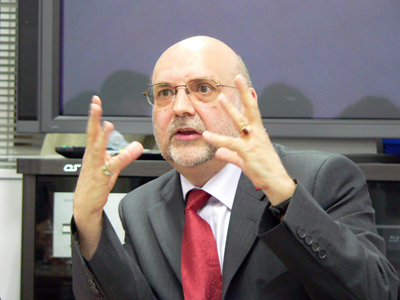UTCP Lecture on Understanding Islam #9: “Intercultural Exchanges between Western Europe and the Arab World: A Utopia?”
On June 4, 2009, the ninth lecture on Understanding Islam was held. The speaker was Francis Guinle, Professor Emeritus at the University Lyon 2, and the title of his talk was “Intercultural Exchanges between Western Europe and the Arab World: A Utopia?”.

Professor Guinle is specialist on Shakespeare and a theater director. He is also an Arabist who spent many years in Arab countries such as Tunisia and Syria, and has thorough knowledge of Arabic literature and history.
As a Western Scholar fascinated by Arab cultures, Professor Guinle began by pointing out difficulties and problems for intercultural exchange between the West and the Arab World. On the one hand, many Arab intellectuals demonstrate a strong attachment to their culture, often identified with the Arabic language, which is represented as what cannot be possessed by Others (as the Moroccan scholar Professor Kilito says, Thou Shalt Not Speak My Language). On the other hand, the majority of French know very little about the cultures of their Arabic (mainly North-African) compatriots, although they are more and more present in that society. Barriers and frontiers remain between two sides.
The historical background of the Western misunderstanding of the Arab World is that of Orientalism. Orientalism, which began as a fascination with and influence of “Eastern” styles on Western literature and music, took more brutal form when the colonial expansion of the West (especially Britain and France) arrived to the Arab World in the 19th century. Colonial domination added a new phase to Orientalism, that of cultural exploitation. Backed by military force, the West began to study the Arab culture, producing a series of images and clichés about Arabs: their religiously justified fatalism, easy and lazy life style, eternal dictatorship, etc. These distorted images of Arabs and Muslims persist even today. Thus, in the recent conflict in ex-Yugoslavia, we saw Muslims categorized as an “ethnic” group. In this situation, how is intercultural exchange possible? Is this idea only a Utopia?
As a way of suggesting a possibility of intercultural exchange between the West and the Arab sphere, Professor Guinle presented some examples of recent “appropriations” of Shakespeare in the Arab World. Arabic directors stage Shakespeare in very creative ways that are more than simply adaptations. For many Arabic theatre-makers, staging Shakespeare may provide very refined ways to express their radical political opinions in their own countries. In his The al-Hamlet Summit, the Kuwaiti Sulayman al-Bassam tells nothing short than a tale about actual Middle-Eastern politics. Hamlet’s Kingdom is a country threatened by the order of a “New Democracy”, promoted by Claudius, Hamlet’s uncle, who took the throne in place of his father. Under the crisis caused by an attack from an old enemy, Fortinbras, backed by foreign imperial forces, Hamlet’s wife Ophelia transforms herself into a terrorist and commits a suicide attack. Narrating these events, the director resorts to the magic of rhetoric, which converts any pastoral scene in Shakespeare’s original text into a bloody one. It is as if the entire story took place within the tense circumstances of the Middle-East.
The second example of appropriation, Al-Zir Salim and Prince Hamlet by the Syrian Remzi Choukair, partly derives from a traditional Arabic Sira (popular epic), called Al-Zir Salim. Prince Salim, the hero of this famous epic, is at the centre of a history of revenge between two royal clans, plunged into killing each other according to tribal laws. On the other hand, we have Hamlet, who is presented as a prince suffering from a dilemma between justice and revenge. What is extraordinary in this piece is that the two heroes literally interact with the other’s history: Hamlet plays characters from the story of Salim, and vice versa. Even the monologues are uttered alternately so as to form a single discourse. Through these dialogues and interactions, the two stories are interwoven into a single story of justice and revenge. The West represented by Hamlet and the Orient incarnated by Salim are thus encountered, exchanged and unified.
During the discussion, questions were raised regarding the concept of “Orientalism” and possible intercultural exchanges that could overcome it.
In answer to a question dissenting from a conflictual vision of the historical relations between the West and the East, Professor Guinle emphasized that besides armed conflicts there also existed reciprocal exchanges (especially economical). It is important to note this even if the feeling of fear and insecurity is frequently referred to and mobilized, in order to form generalized images about the Orient in the West.
At the same time, a kind of “Occidentalism” exists on the Arab side. That is, a series of representations acquired through Western (or American) TV and through films, which provide Arab peoples with violent and materialistic images of the West.
As for the possibility of intercultural exchange between the two worlds, Professor Guinle stated he is obliged to be a pessimist, given the actual situation. To add to the complexity and difficulty that exists in the very nature of the Arabic language, politicians do too little in the field of cultural exchange, and the question depends largely on individual efforts.
So far, intercultural exchange may be a utopia. But the magic of theatre makes visible, at least symbolically, a way to overcome “Manichean” discourses on the opposition between East and West.
Reported by Shoko WATANABE






